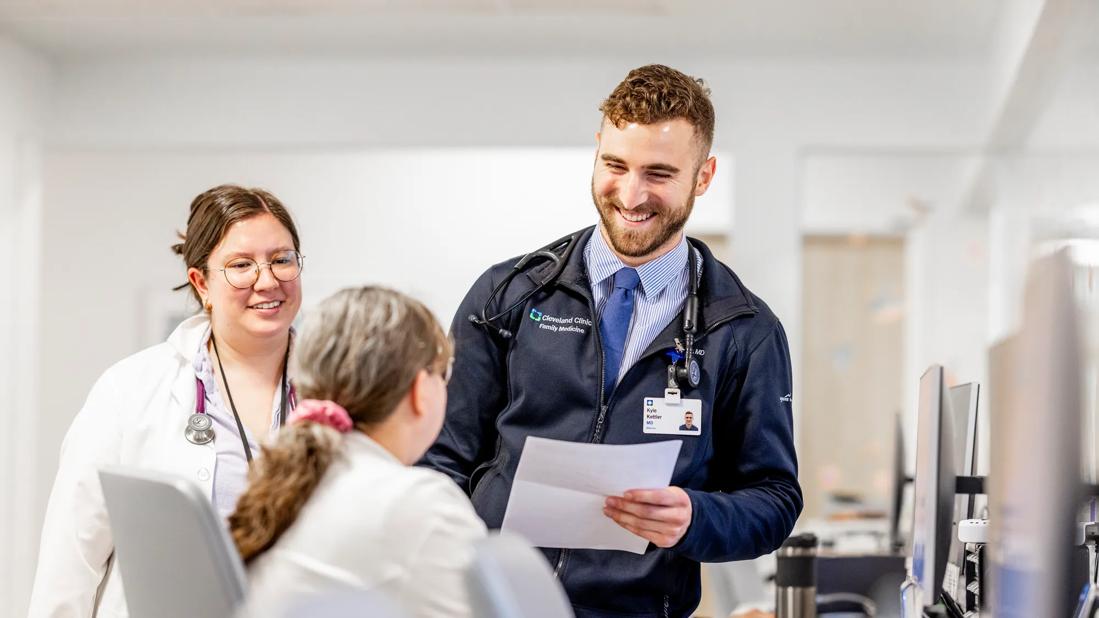Program pairs nurse preceptors with medical students

A team-based approach is essential in healthcare today and programs need to be created to truly foster teams – particularly early in caregivers’ careers. A unique program offered by the Ohio University Heritage College of Osteopathic Medicine (OUHCOM) in affiliation with Cleveland Clinic aims to transform medical education by integrating students within healthcare delivery teams from day one. And nurses are an integral part of the equation.
Advertisement
Cleveland Clinic is a non-profit academic medical center. Advertising on our site helps support our mission. We do not endorse non-Cleveland Clinic products or services. Policy
Launched in 2018, OUHCOM’s Transformative Care Continuum (TCC) is an accelerated demonstration project, from medical school through residency, to prepare students for careers in family medicine. Each year, eight students join the six-year program and are embedded at Cleveland Clinic Lakewood Family Health Center or Cleveland Clinic Akron General.
“During their first three years, our medical students spend one half-day per week in Lakewood or Akron learning from an interprofessional team of nurses, care coordinators, social workers, pharmacists and physicians,” says Sandra Snyder, DO, Program Director of the Family Medicine Program at Lakewood Family Health Center. The first year the students function as medical assistants, the second year as care coordinators and patient educators, and the third year as medical students akin to third- and fourth-year traditional programs. Upon graduation, they transition into their three-year family medicine residency programs at the same facilities.
Throughout the TCC program, nurses play an important role. During the first year, nurses and medical assistants (MAs) serve as preceptors.
“The students learn how to do patient intake, medical assistance interventions, blood pressures, immunizations and other tasks by working alongside nurses and MAs,” says Alex Boyadjieva, BSN, RN, Ambulatory Nurse Manager and Co-Director of Interprofessional Education at the Center for Family Medicine in Lakewood.
Boyadjieva organizes and conducts clinical onboarding for the students prior to their first patient visit. The students then shadow nurse and MA preceptors, followed by reserve shadowing. “By the end of the first semester, the students are fairly well-rounded and handle patient intake and vital signs by themselves,” says Boyadjieva. “The nursing staff continues to precept, assist with interventions, make sure the students are documenting encounters correctly and answer any questions the students may have.”
Advertisement
Dr. Snyder says the precepting experience not only teaches medical students important skills, but it also gives them an appreciation of the roles of nurses and medical assistants in primary care. “Starting out with a nurse as their supervisor early in their career is something unique that can change the nature of the physician-nurse relationship in the future from a hierarchical relationship to a team-based one,” she says.
Another innovative component of the TCC program is its focus on population health. In addition to working at family medicine centers during their first three years, students also spend another half-day per week examining and designing health and quality improvement initiatives aimed at improving primary care.
“The interdisciplinary team, including nurses, has been instrumental in developing a longitudinal population health curriculum for our medical students,” says Dr. Snyder. Boyadjieva and the pharmacist at the Center for Family Health present different topics each week, beginning with an explanation of population health and Cleveland Clinic’s STAMP curriculum (Strengthening Teams And Managing Populations). Other topics range from using the Epic electronic health record system to interacting with patients over the phone.
The students also create and carry out community-based quality improvement projects during their first and second year, with nurses serving as mentors. Some of the projects have concentrated on testing the homeless population for HIV, improving medicine reconciliation rates, increasing blood pressure follow-up appointments and improving the rates of colorectal cancer screenings.
Advertisement
Medical students aren’t the only ones who benefit from the TCC program. “Our nursing staff has gained quite a bit, too,” says Boyadjieva. “We are creating opportunities for them to teach, receive training in Six Sigma and TeamSTEPPS® (focused on performance and patient safety), and gain insight in what it takes to be a physician.”
Nancy Richards, MSN, RN-BC, NEA-BC, Ambulatory Nursing Director for Cleveland Clinic Fairview Hospital, calls the TCC program “the model of the future.” Dr. Snyder agrees.
“Having medical students functioning in different team member roles during their training and including our interprofessional team in curriculum development for medical students is novel,” she says. This can only enhance team-based primary care delivery in the future.
“Physicians have a difficult time providing the full range of services that improve patient outcomes, such as care coordination and intensive follow-up of high-risk patients,” says Dr. Snyder. “There is strong evidence that a team-based model of care is better able to meet patient needs, improve patient safety and quality of care, and increase caregiver satisfaction.”
Advertisement
Advertisement

Planning continues with critical, patient-focused input from nursing teams

Strengthening care through targeted resources and frontline voices

Embracing generational differences to create strong nursing teams

CRNA careers offer challenge and reward

An unexpected health scare provides a potent reminder of what patients need most from their caregivers

Cleveland Clinic Abu Dhabi initiative reduces ICU admissions and strengthens caregiver collaboration

Veteran nurse blends compassion, cutting-edge transplant training and military tradition to elevate patient care

Embrace coaching and other tips to be a stronger leader